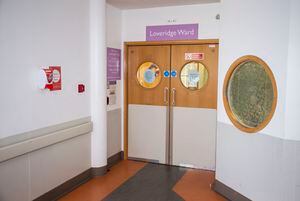Consultants said not to be concerned about abnormally fast heart
WHEN Emma Wilkins attended a routine ante-natal appointment at 33 weeks in March 2019, the sonographer detected an abnormally fast foetal heartbeat of some 220 beats per minute. This was described as ‘slightly unusual’.

At that time the consultant obstetrician was away and a locum, still going through induction, was in place. The scans were reviewed and the locum accepted that they were unusual.
But as previous scans had appeared normal, it was left that Mrs Wilkins would see another consultant at a later date. Further appointments were due later that week.
The Wilkins’ sought a second opinion by going to Loveridge Ward.
A second locum obstetrician was there and Freddie’s heart was not scanned. Mrs Wilkins said the couple were reassured that everything was all right. They were called later that day and informed that the consultant was satisfied with the scan results.
At a subsequent appointment with the consultant, Mrs Wilkins was again told there was no cause for concern, although she felt ‘quite annoyed’ that this appointment had lasted only five minutes. On neither occasion was the heartbeat listened to.
It turned out that the obstetrician had taken reports of a ‘slightly unusual cardiac rhythm’ to be another issue, of no clinical significance.
Freddie’s heart had been structurally normal at 20 weeks.
Mrs Wilkins said had she been made aware of the actual findings, matters would have been handled differently.
Just a few days later on 22 April, she attended a routine midwife appointment at the antenatal clinic at the hospital.
The midwife was concerned about the baby’s heartbeat, called the on-call locum obstetrician, and Mrs Wilkins was admitted to Loveridge Ward.
The baby was born by emergency caesarean section just two hours after she had attended the hospital.
Freddie was transferred to the neo-natal unit, but despite being given medication, his condition deteriorated and he died at 6.40pm.
Changes made to procedures following Freddie’s death
HEALTH & Social Care and the Medical Specialist Group have issued a joint statement following an inquest made into the death of a baby boy in 2019.
‘HSC and MSG would like to express their deepest sympathy to the Wilkins family for the tragic loss of their child Freddie.
‘While the judgement of our highly-trained staff and consultants will always play a pivotal role in the delivery of care, whenever there is a serious incident we always consider any learning as part of our clinical governance arrangements. This enables us to identify whether our processes and procedures can be further strengthened.
‘Following this case, changes were made to further reinforce the processes for escalating sonography concerns and also a review of the induction of locum consultants was addressed.
‘HSC can confirm that all recommendations and actions from the independent report were completed and are monitored regularly.’





